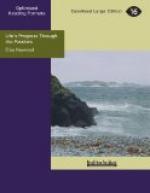These terms rid Natura of a great part of that insupportable constraint he had been under, but gave not the least satisfaction, as to his jealousy of honour; he doubted not but she would be guilty of many things, injurious in the highest degree to their public character, and which yet it would not so well become him to exert his authority in opposing, and these reflections gave him the most terrible inquietude; which shews, that though jealousy is called the child of love, it is very possible to feel all the tortures of the one, without being sensible of any of the douceurs of the other passion.
How dearly now did Natura pay for the gratification of his ambition!—What availed his grandeur, the respect paid him by his equals, and the homage of the inferior world!—What the pride of having it in his power to confer favours, when he had himself a heart torn with the most fierce convulsions, and less capable of enjoying the goods of fortune, than the most abject of those indigent creatures, who petitioned for relief from him!—By day, by night, alone, or in company, he was haunted with ideas the most distracting to his peace.—A smile on the face of his wife, seemed to him to proceed from the joy of having made some new conquest; a grave or melancholly look, from a disappointment on the account of a favourite gallant: yet as her person was the least thing he was tenacious of, the behaviour of others gave him greater pain than any thing she could do herself;—whoever spoke handsomely of her, he imagined insulted him; and those who mentioned her not at all, he thought were sensible of her levity, and his misfortune:—every thing he saw or heard, seemed to him a sad memento of his dishonour; and though he could not assure himself she had in fact been guilty of a breach of her virtue, he was very certain she had been so of that reserve and modesty which is the most distinguishable characteristic of it, and took from him the power of vindicating her innocence, or his own honour even though he had believed them safe, as becomes a husband, whose wife is more cautious of her conduct in this point.
Too delicate of the censure of the world, it gave him the utmost anxiety how to carry himself, so as not to afford any room to have it said he was either a jealous, or a too credulous husband; yet in spite of all his care, he incurred both these characters:—those who had heard of his sending her into the country, without being acquainted with the motives for his so doing, looked on him as the former; and those who saw her manner of behaviour, and the seeming politeness of his treatment of her, imagined him the latter:—so difficult is it for any one, who only sees the outside of things, to judge what they are in reality; yet the vanity of having it believed they are let into secrets, makes a great many people invent circumstances, and then relate for matters of fact, what are indeed no more than the suggestions of imagination, or, what is yet worse, the coinage of their own brain, without believing themselves what they take upon them to report to others.




